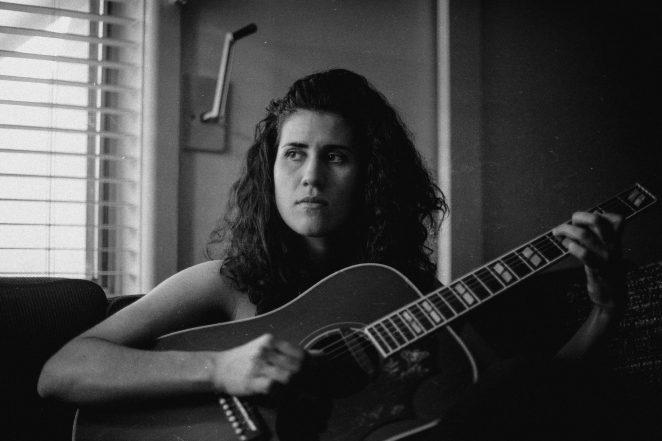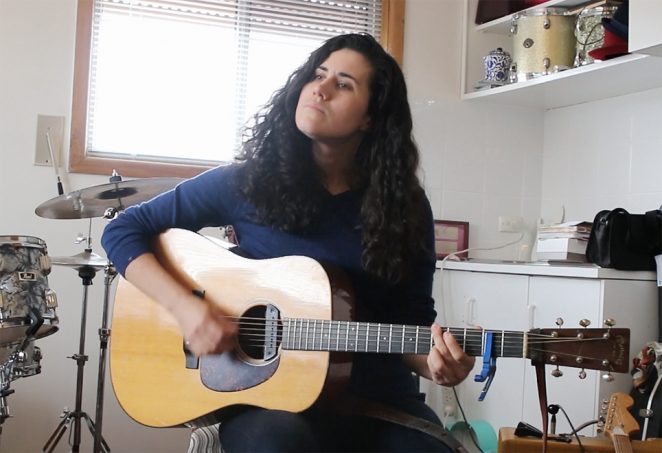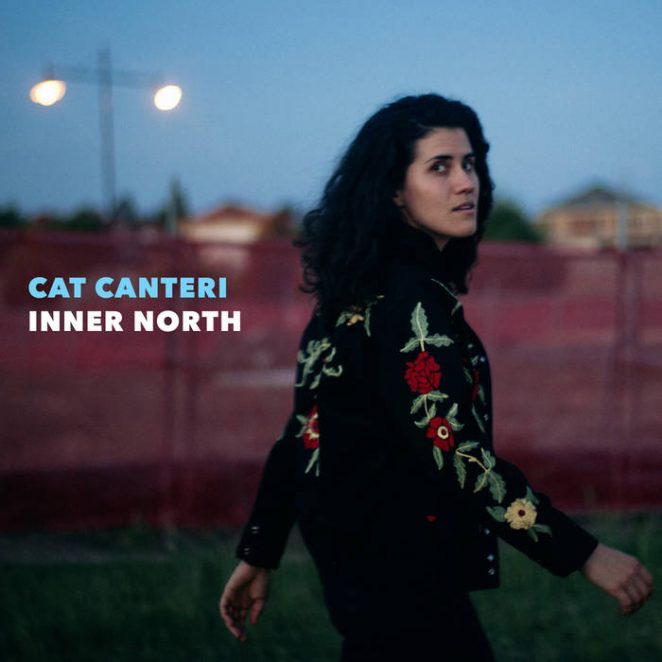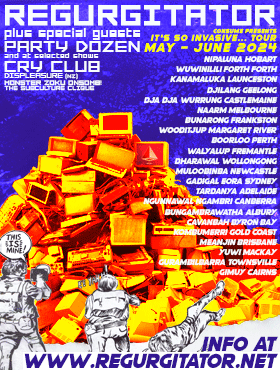
For most musicians who have played in a band for some time, there’s that solo album itch that eventually needs to be scratched. Melbourne-based singer, songwriter and multi-instrumentalist Cat Canteri did just that in 2014 when she diverted from her role as drummer/vocalist with alt country band The Stillsons to release When We Were Young, her critically acclaimed debut album. After touring the solo material with her band for a couple of years, she then captured the stage essence of her new musical identity with Late At Night, a live recorded EP. In May this year, Cat released her second studio album Inner North, a record which reveals a composer expanding her horizons and striving to master the art of storytelling in song. Inner North sees Cat tapping into the memory banks and not only exploring imagery from her youth but also thinking deeper about the past and asking questions.
Australian Musician’s Greg Phillips sat down with Cat for an in depth discussion about the creation of Inner North.
Cat, your new album is called Inner North. What was the inner north suburb that you grew up in?
I grew up in Northcote, one of the inner suburbs of Melbourne just a couple of kilometres north of the CBD. I grew up in this little neighbourhood which was enclosed by two main roads, and a creek and parklands, so it was cordoned off. It was a discreet area, it was like this is the bounds of the neighbourhood. There were a lot of children. Pretty much every house in the street had children. I played in the street and made friends with the kids and we’d be on roller blades and doing jumps and as you got older, you could venture further. Gradually you’re allowed to go down to the park on your own with your mates. In a lot of ways it felt like growing up in a country town. Everybody knew each other, all the parents and kids knew each other. What I really liked about it was that I had a friendship group that was separate to my school friends. That was great because if you find being social at school challenging for whatever reason, you’ve got something else.
At what point did music become important to you?
I think music became really important when I was 14 or 15. When I was ten I wanted to start to play the drums. I’d always done school choir and really enjoyed that but I really nagged my parents about the drums and it took about two years before they let me have a drum kit. I started learning the drums in high school and it wasn’t until 14 or 15 that music became really essential to my identity. Up until that point I was a skateboarder but I had an injury and couldn’t do the things I wanted to do anymore. I decided I wasn’t going to skateboard anymore and had an identity crisis and where I went with my identity was music. At that point I already wanted to start writing songs, so I taught myself to play guitar and had started a diary to write lyrics. It took me a couple of years to get my first proper song. I did VCE music at school and had a band with some kids from a neighbouring high school which was awesome. As with any teenager, music is really important to you as it is a really safe place to go and doesn’t let you down.
What were the albums which were important to you at the time?
With the band I was playing in, it was the early 2000’s so the music we were listening to was Audioslave, Rage Against the Machine and Pearl Jam, Nirvana, 90s grunge and rock. Then when I was 16 a friend introduced me to Ani DiFranco and I became a huge fan and still love her music. There was something really different about her music that I hadn’t heard before. She mixes up spoken word poetry with music and her bands are this melting pot of jazz, funk, blues, country, a really unusual mix of musicians on stage. Her work is groove and lyric focussed. She’d have a horn section but it wouldn’t be the usual trombone, alto sax, tenor sax and trumpet, she’d have clarinet in there and other odd instruments, so I got into her music big time.
At what point did you decide to put your childhood memories into a theme for this album?
It wasn’t so much a conscious choice. The record is a real mix of … I was going to say fact and fiction but the way I explain it is that when you are a songwriter, I assume it is the same with a visual artists or painter … you not only absorb your environment and other media but you absorb everything around you, it goes inside you, gets mixed up like a soup and comes out in many different ways. I think there are things in my work which have often reflected my past or where I am from. I guess with this album I have made a switch to more lyric centred music, more narrative style songwriting. I feel like it is a folk approach. I was trying to write material that I could go and play on my own and it would still stand up with an audience with just guitar and one person singing. Not all songs are like that. Some songs are riff based or it’s about everything that surrounds the words or it’s about the arrangement or production. I’d played a lot with my band and had started to do gigs in country Victoria on my own and when I was playing to these audiences I just felt that I needed stronger songs that stood up and translated to an audience without any additional instrumentation. So I guess that was what my focus was, to be able to have a set of songs where I didn’t need anybody else with me to translate the message of the songs. I felt that it was important to me as an artist to have that freedom of knowing my music will translate and not being bound by having people with me … as much as I love having the band play with me, it is really liberating to go out and play completely on your own. I feel like when you go out and play on your own, you relate to the audience differently, you have different conversations with and it is a completely different experience. I guess it wasn’t a conscious choice to put childhood stuff into a record, it was more about trying to write strong songs and also moving towards a more narrative style of songwriting, plus that age old thing of writing about what you know.
One of the songwriters who is really inspiring to me is Michael Waugh. I first saw him play at Newstead Folk Festival and his songwriting blew me away because he does that folk narrative thing but the topics he chose and the way he expressed them through song, blew me away. You listen to the songs and really get transported inside the songs and you feel like you are having the experience of the protagonist in the song. Very moving stories and very Australian stories. It’s like when you read a good book or hear a great song and you think, I know this, I know this scenario … why didn’t I think to write about this? One of things I was trying to do with my songs like Fitzroy Bowl and Pentridge Wasteland on this album, I was trying to tell human stories, not just about the people in the songs but they kind of had deeper social and political messages within the songs. With Fitzroy Bowl, you have a situation that I think a lot of people have been in, where you have friends as kids and you lose touch. The friendship falls apart and it’s not anyone’s fault. In the story it turns out that the reason the friendship falls apart is because one of the kids’ family life falls to pieces and he goes into foster care but within the song their are deeper elements. Children trust really easily, they make friends easily and they care about things really easily. As adults we tend to distance ourselves from people a little bit more. So within that song there’s this commentary about as adults, how we don’t want to over step the mark with people and pry into people’s lives. We are much more cautious about stepping over the line and intruding into other people’s family life. The there’s also the element about the culture and what we teach young boys about self expression and what it is to be a man and being taught to show your feelings and that showing your feelings is not a sign of weakness. There are all of these elements wrapped up into one song.
By name-checking places and areas of Melbourne, have you had people from the inner north come up to you to say they can relate to these songs?
Yes I think with Fitzroy Bowl in particular. It took me a while to finish writing that song. I was doing these country gigs, kind of road testing the song. With that song, people would often come up to me and say I used to live in Fitzroy and go down to the Edinburgh Gardens, so they were drawn to the song because they know the places you are talking about. It wasn’t an intentional part of the songwriting. I wasn’t trying to name drop places or be thematic. What happened at the end of the recording process was that I had a name for the album and I’d sent the title to one of my friends, Les Thomas, who had helped me finish a couple of songs on the record … he said, nup I have got the name! He said you are very much a person of your community and very central to your identity is where you are from and the family history there, it comes through in your music.

There was a time where apart from Paul Kelly, Mick Thomas and not too many others, nobody else really name-checked Australian places or streets. In America they have no problem doing that. I think we’re are starting to get over that now with artists like Courtney Barnett and Smith St Band not being afraid to reference Australian names. I guess you feel that too?
I thinks so. As Australians we’ve always had this severe case of cultural cringe. You see it a lot with artists. They go overseas and come back and they are taken way more seriously if they have had some sort of perceived success. It’s really sad. Like today I was listening to Radio National, that’s my station. I have listened to it since I was a kid. I was listening to Breakfast this morning and they had album of the week and it was an artist from the states. At least every fortnight there will be someone I personally know who will release a record of quality music and that’s just people I know. Isn’t that a massive shame that our national broadcaster can’t prioritise giving a voice to Australian music or art? I feel like it is a massive crime. At the end of every news broadcast we have a sports section. Why isn’t there an arts section as well?
For your debut album you wrote most of the songs on piano and then had to learn them on guitar to play live. These songs sound like they were written on guitar … was that the case?
Yes all of the songs on this album were written on guitar. I think with the first album I was at university and there was a piano at my disposal but with this record it is all guitar, which I love.
Did you have a discussion with the producer, Jeff Lang about the sound you wanted for this album before you started?
No nothing like that, it was pretty organic. I have worked with Jeff a lot. I was on both of Justin Bernasconi’s records, one of Allison Ferrier’s records, two of Jed Rowe’s records, some backing vocals on one of Jeff’s records. I know what he does and how he works and that’s why I choose to go with him. I’m not really thinking about the sound of the record when I go in, it is more about capturing a performance. The people that I choose to play on the record, I know what they do and the tone that they play with. I love what they do and their sensibilities, If you want something different you can ask them. It really is on a song by song basis and capturing a performance.
You started out as a drummer but you didn’t play drums on this album. Why did you decide to get someone else in?
With my first album, I didn’t have a band together so it was an obvious choice for me to just play the drums. When I made my last record, it was a live thing and I’d been touring with the band and wanted to capture what the band did. With this one, I suppose I could have tracked it on drums but I didn’t really think of it to be honest. Justin Olsson who plays drums for me … I love what he does and I enjoy listening to him play. With this recording the plan was to do two days and get what you call bed tracks, basically drums and bass. We didn’t use a click track, everyone just plays live and I sing live and it’s about trying to get a performance down and then you look at re-doing vocals or guitars or whatever but I ended up keeping a lot of it. I think there were only 2 or 3 songs that I re-tracked. Likewise with the guitars, predominantly it is what happened when we originally recorded. We didn’t go in planning that. We’d listen back and think ok, well that’s good. Sometimes I’d think, well I could redo it but there is nothing wrong with what is there. I could go for another aesthetic choice but what’s there works and is good, so is there really any reason to change it? I actually found the hardest part was when I did have to redo some vocals because you are now thinking about it, not like when you’re recording with the band and just focussing on getting a good all round take.
What guitars did you use on the album?
I used my Gibson Hummingbird for most of the acoustic tracking. On the last track Make Up Your Mind, I used a Dan Robinson acoustic guitar, he’s a guitar maker from Victoria. I used Justin’s Martin D18 on Pentridge Wasteland and on Bridget Agnew I used this 1930s Kalamazoo acoustic that Jeff had. It had a DeArmond pickup in it. On The Only One, the opening track I used a Hondo II Stratocaster that has Fender Special tech pickups in it. That guitar cost me 150 bucks and the pickups costs 350 and the tuners cost a 100 bucks. The slide solo on The Only One was done on my Greco 335 copy. The solo on Remember The Time was played on Jeff’s Les Paul knock off made by Pearl, the drum company. He’s got these pickups in it that give you that Peter Green out of phase sound. On Tram Stop, I used my Mustang to get that honky out of phase sound too. On the solo of Take Me Away, I used Justin’s Les Paul Standard.
How did that work? Did you try one guitar and if it wasn’t working, pick up another guitar and try another tone?
For the songs where I sing and play acoustic it is instinctual that I go for the Gibson Hummingird. For Make Up Your Mind, the last track, I wrote that song on the Dan Robinson so I wanted to play it on that too. With Bridget Agnew we did a bit of workshopping with that in the studio. Originally it was like a rock song with big guitars but we tried tracking it like that twice and it wasn’t working. So we tried something else and it was Jeff who suggested the Kalamazoo. With the guitar solos, I had an idea of what I wanted sound wise for a lot of them and for others, Jeff would suggest stuff. The Greco has humbuckers and I knew that was the sound I wanted for a lot of the solos.
 Was it difficult to let the album go and say it is finished?
Was it difficult to let the album go and say it is finished?
The thing that I found the hardest was doing all of the little bits at the end. Once the majority of the stuff is tracked, there are the little bits that you have to redo and sometimes that can take longer than the actual tracking. You have to be careful not lose perspective and spend too much time on a small part of a song, disproportionately to what it is worth. It is really easy to do that and Jeff is great, he’s really good at keeping things on track. He really did with me at the end because I did lose perspective on some things. His things is to get it down and don’t linger on it. Once you actually finish the recording, it’s like, this is awesome but then you have to mix it and master it and do the artwork, get it manufactured and that’s a whole process in itself. You have to find the people to do that and then get it done in time so your whole release plan doesn’t get out of whack. Independent artists have to be really aware of that stuff. You might know who you want to mix it but they may not be available for a whole month. You get it mixed but you might not like one track and you have to go back and get it done again, that might take a few weeks. All if a sudden two months have gone past, you send it for mastering and the same thing happens again. You get the art done but there might be typos on it… all this stuff, so it is really easy for the timelines to get out of whack. It takes a lot of energy when you are doing it all yourself.
The tour starts in couple of weeks. What will the band set up be?
It will be me on vocals and guitar. Justin Bernasconi on guitar and vocals. Isaac Barter is on bass for the whole tour. For the first part of the tour, I will have Justin Olson on drums. When I do the NSW Queensland shows I am taking Danny McKenna, who is a wonderful drummer who plays with Mia Dyson and Jeff Lang. I’m looking forward to it.
Cat Canteri’s Inner North is available now via Mountain King Music on Bandcamp
WEBSITE: https://www.catcanteri.com/
Inner North tour dates:
Friday 18 May – Basement Discs In-Store Performance, Melbourne VIC
24 Block Pl, Melbourne VIC 3000 | 12.45pm sharp
Sat 19 May – Old Church On The Hill, Bendigo VIC
36 Russell St, Quarry Hill VIC 3550
Tickets click here: $10 pre/$15 on the door
Special guest Well Into Winter and Sherri Parry
Doors 7pm
Sunday 20 May – Northcote Social Club, Melbourne
301 High St, Northcote VIC 3070
Tickets click: $15 pre/$20 on the door
Special guests TBA
Doors 2pm
Fri 1 June – Selby Folk Club, Selby VIC
1 Minak Road Selby Vic 3159
Tickets click here, $12
Doors open 7.30pm, music starts at 8pm
Sat 2 June – Baby Black Espresso, Bacchus Marsh VIC
10 Church St, Bacchus Marsh VIC 3340
Tickets Click Here: $17 pre-sale, $20 on the door
Special guest Justin Bernasconi
Doors open 6pm, music starts 7pm
Sun 3 June – Bridge Hotel, Castlemaine VIC –
Double Album Launch with John Flanagan Trio
21 Walker St, Castlemaine VIC 3450
Tickets click here: $15 pre-sale, $20 on the door
Door 2.30pm, music 3pm
Fri 15 June – Saint Monday, Yackandandah VIC
26 High St, Yackandandah VIC 3749
Tickets click here $55 dinner and show, $25 show only
Dinner 6pm | Show doors 7pm, music starts 7.30pm
Sat 16 June – Major Tom, Kyneton VIC – Double Album Launch with Ben Mastwyk
57 Piper St, Kyneton VIC 3444
Details & tickets coming soon
Wed 4 July – Rambin’ Nights, Heritage Hotel, Wollongong NSW
with Ben Mastwyk and Susie Scurry
240 Princes Hwy, Bulli NSW 2516
Click here for tickets
Thu 5 July – Rambin’ Nights, Brass Monkey, Cronulla NSW
with Ben Mastwyk and Susie Scurry
42 King St, Newtown NSW 2042
More details and tickets coming soon
Fri 6 July – Rambin’ Nights, Sly Fox, Newtown NSW
with Ben Mastwyk and Susie Scurry
199 Enmore Rd, Enmore NSW 2042
Click here for tickets
Sat 7 July – Wauchope Arts, Wauchope NSW – Double Album Launch with John Flanagan Trio
Oxley Ln, Wauchope NSW 2446
Tickets Click Here: $25/$20 members
Doors 7.30pm
Sunday 8 July – LiveSpark, Brisbane Powerhouse, Brisbane
119 Lamington St, New Farm QLD 4005
Turbine Platform 4.30pm | Free
Sun 8 July – Lefty’s Old Time Music Hall, Brisbane QLD
15 Caxton St, Petrie Terrace QLD 4000
Music starts 8.30pm | Free
Tues 10 July – Brisbane Unplugged Gigs, Brisbane QLD
New Farm Bowls Club 969 Brunswick St opposite New Farm Park
Tickets $10 on the door
Music starts at 8pm
Wed 11 July – 5 Church St, Bellingen NSW
5 Church St, Bellingen 2454
Tickets Click Here: $15 pre/$20 on the door
Special guest, Justin Bernasconi
7pm
Thu 12 July – Beach Hotel, Byron Bay NSW
1 Bay St, Byron Bay NSW 2481
Music starts 7.30pm | Free
Fri 13 July – Upper Lansdowne Hall, Upper Lansdowne NSW
1412 Upper Lansdowne Road, Upper Lansdowne NSW 2430
Tickets $22 pre-sale (click here), $25 on the door
Special guest Justin Bernasconi
Doors/Food 6.15pm, BYO
Sat 14 July – Stag and Hunter, Newcastle NSW
187 Maitland Rd, Mayfield NSW 2304
Special guest Steel City Sue
Tickets $10 pre-sale (click here)/$15 door
Doors 7pm
Sun 15 July – Smith’s Alternative, Canberra ACT
76 Alinga St, Canberra ACT 2601
Tickets $20/$15 Canberra Music Club Members
Sat 11 August – Blues Tram, Bendigo VIC
Blues Tram, feat: Cat Canteri + Luke Watt
Departing Central Deborah Goldmine (76 Violet Street) at 2pm, returning 4:15pm.
Tickets (click here) $35
More shows to be announced


